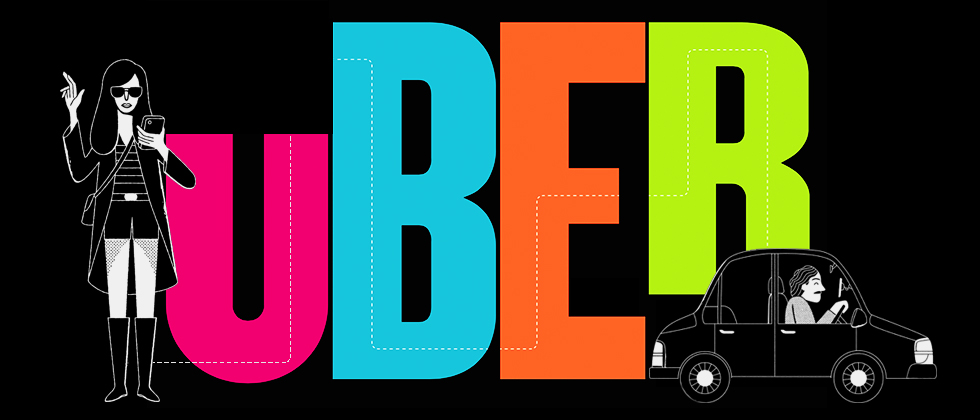How to Be the Next Uber
They’re the new economic giants—and mostly, they’re glorified middlemen. From Alibaba to Uber, platform companies are reshaping how we do business.
Uber doesn’t own taxis, eBay doesn’t carry inventory, and Facebook doesn’t create content. These businesses thrive not by making and selling products but by offering a platform for users to connect with one another and exchange something of value—a ride home, a collectible doll, a photo of your adorable nephew.
The coauthors of a new book, Platform Revolution: How Networked Markets Are Transforming the Economy—And How to Make Them Work for You, argue that the platform model is what gives some of today’s fastest-growing companies, including Google, Apple, Alibaba, and Amazon, their disruptive power. One of those authors, Marshall Van Alstyne, an associate professor and chair of Information Systems, answers Everett’s questions about this potent new business model.

Marshall Van Alstyne says markets not involved in platforms are likely to get squeezed. | Photo by Kalman Zabarsky/BU Photography
Everett: You’ve said that platforms beat products every time. What makes platforms so powerful?
Van Alstyne: There are two things. The first is network effects. As more people join a platform, it becomes more valuable, so more people join it, so it becomes more valuable. You get what economists call a demand economy of scale. These feedback loops create giant winner-take-all marketplaces.
The second reason is that platforms tend to innovate faster. You’re not just creating new products and ideas on your own, you’re also getting third parties to bring you their ideas. So even when a platform starts from behind, it catches up and passes a standard product.
Are all platform companies internet-based?
The products don’t necessarily have to be internet-based. In some sense, a shopping mall is a platform, where you’re matching stores to customers. But being online dramatically reduces the transaction cost and also makes it easier to capture data.
Do you think any business has the potential to become a platform?
Pretty much so, but some industries will transition sooner rather than later. The higher the proportion of regulation in an industry, the less likely it is to transform. Also, the higher the proportion of value from heavy assets—oil, mining, and drilling—those are industries that are harder to transform.
Because they rely on two-sided markets, new platforms nearly always face the chicken-and-egg dilemma. (Without drivers, Uber can’t offer rides; without riders, Uber can’t attract drivers.) Do you have some favorite examples of ways platforms have solved this problem?
One way to solve that challenge is through subsidy, greasing the market by paying one side to participate. When Uber enters a new area, it offers subsidies to drivers to get them to start on the ecosystem.
Another strategy is fake it ’til you make it. PayPal faked demand by buying and selling goods on eBay and insisting that the person on the other side use PayPal for the transaction. It’s pretty clever because you can buy something on eBay, and then turn around and sell the same thing again, so you have almost no cost, and you have effectively faked demand by providing it yourself.
Because they’re not directly selling products, many platforms struggle to charge money for what they offer. Can you give an example of a platform that got its monetization strategy wrong?
There are lots of great examples of that. Initially, Apple was terrible. If you go back to the 1980s and ’90s, they were charging $10,000 for their system development toolkit. That’s a disaster because you need developers to grow your ecosystem. By charging so much, they were limiting one side of the market coming onto the platform.
When Adobe first launched the PDF format, it tried to charge for the reader and charge for the writer. That’s a terrible mistake. No one wants the reader if there’s no writer. And who wants the writer if there’s no reader? It wasn’t until they gave away the readers that they could subsequently charge for the writers.
Those two companies still exist, so it must be possible to recover from such mistakes.
It can be. But if you understand the design principles of platforms, you can get it right without these really expensive experiments. That’s one of the reasons we wrote the book.
Many platform companies have built huge user communities without spending a dime on traditional advertising. How is marketing a platform different from marketing a product?
Rather than just blasting messaging out to folks, often you can have your users create messages for each other. One of my favorite examples is Warby Parker, the eyeglass manufacturer. They’ll give you five pairs of eyeglasses and encourage you to put pictures of yourself on Instagram and Facebook and have your friends vote on which fashion looks best on you. You then return the pairs that you don’t want. It’s brilliant. The users are creating the message, they’re getting feedback on what fashion looks good on them, and they’re subtly promoting the brand.
It’s hard to compete against an established platform. If most of your friends are already on Facebook, what’s the point of joining a new social network? Is a world of platforms destined to be a world of monopolies?
We argue that we are seeing, in the internet era, the rise of giant monopolistic firms, exactly analogous to the rise of giant firms in the industrial era. History is repeating itself, but it’s for the opposite reason. In the industrial era, the driver of the monopolization of industry was a supply-side economy of scale. To ship your first railroad car from New York to Chicago is very expensive—to lay tracks, to hire employees, to build the locomotives. And then to ship your second one is extremely inexpensive. That creates a positive feedback loop where, as you get scale, you can afford to lower prices, which drives out competition, which gives you more volume, which allows you to lower prices, which drives out competition. The same thing is reemerging today, but it’s the demand curve shifting out, rather than the supply curve shifting down. And the tendency is for these large firms to get larger and larger and larger.
With demand driving monopolistic growth rather than supply, are these kinds of monopolies better for the consumer?
Well, it’s an interesting question. Users creating value for other users means you’re probably getting things that you wouldn’t otherwise have. You’re getting free internet search, free email, a free social network, discounted rides, cheaper hotel rooms. When you’re bringing spare capacity online, prices tend to go down, so in that sense, it’s not worse for consumers.
But if you look at it in terms of fairness, the larger the firm, the easier it is for it to exploit ecosystem partners. Facebook is among the top 10 most valuable firms in the world, but how much of that value is actually being shared directly back to consumers, who create the value? Or there’s the possibility that Uber charges a disproportionate share of the rides to the drivers or doesn’t insure them properly or doesn’t provide retirement benefits. We’re probably going to need to see the reemergence of protections of ecosystem partners in much the same way we saw the emergence of those protections in the industrial era.
Most experts agree the US health care system is woefully inefficient. Do you see platforms helping to solve this problem?
I do think it will be possible for platforms to make more efficient use of resources within a health ecosystem. In hospitals, for example, MRI machines may be used less than 60 percent of the time, but they’re multimillion-dollar pieces of equipment. You can boost utilization rates by opening access to smaller clinics that can’t afford them, effectively becoming the Airbnb of MRI machines.
But remember that I also said heavily regulated industries are more resistant to the platform transformation, and health care is heavily regulated. It’s going to be a slower transformation.
What other sectors of the economy are ripe for transformation by platforms?
I think education is in for some fairly sweeping changes, as you move more in the direction of massive open online courses.
Eventually, I’m optimistic that we’ll actually do some platform transformation of government. In Boston two years ago, we had massive snowstorms, and city governments didn’t have the resources to handle it. But imagine if you had an Uber-like model, where you were able to harness citizens with snowplows and get them to chip in on those streets that are not yet plowed. You’ve got expansionary capacity there that would make a huge difference in efficient running of government. Or if you can introduce transportation platforms with self-driving cars, you can dramatically increase the efficiency of traffic flow. You can even change the urban layout.
Given the transformative power of platforms, if I’m not already working for a platform company, should I be looking for a new job?
Different industries are going to transform at different rates. If you’re not going to be the platform itself, then you’re likely to be a partner on someone else’s platform, and if you’re not on someone else’s platform, then you’re off platform entirely, and those markets are likely to get squeezed.

